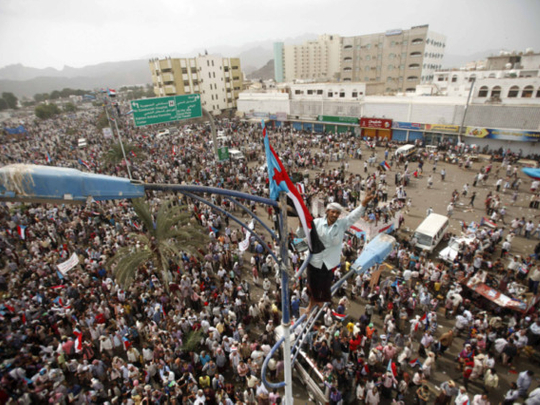
Sana’a: Tens of thousands of southern Yemenis took part in massive rallies on Sunday calling for autonomy for their region despite government sops designed to encourage them to engage in national dialogue.
The rallies were organised to commemorate ‘Reconciliation Day’, which is intended to mend the differences that ensued between southerners from a bloody coup in January 1986 that claimed the lives of thousands of people in the former South Yemen.
The biggest protest was arranged in Yemen’s second city Aden, where thousands of secessionists carried the flag of the former South Yemen and shouted slogans calling for independence from the north.
“Our gathering today is aimed to let bygones be bygones and forget the past and looking at the future.” said Huda Al Attas, a southern activist. “We want to reiterate that we are committed to our choice of independence, liberation and regaining our country [from the north].”
To tempt the southerners to join the stalled national dialogue, the Yemen government has recently offered incentives, including giving the south 50 per cent of the seats of the national dialogue conference.
The southerners demand the termination of the unity deal of 1990 between the former Democratic Republic of Yemen and Yemen Arab Republic .
Yemeni president Abdu Rabbu Mansour Hadi has also ordered the formation of two panels to address the grievances of the southerners. The first panel was tasked to handle complaints about land that was looted after the civil war in 1994 while the second panel is to deal with cases of civil servants and security officials fired from their jobs after the civil war.
The Southern Movement, the umbrella group of southern separatists, have refused to join the national dialogue. “We would like to say no to the dialogue unless it is based on dialogue between two states [south and north]”, Huda said.
Similar protests were organised in the other south Yemen provinces.
The civil war broke out four years after unification when the north, backed by some defected southerners, attempted to end the unity deal. On July 7, 1994, northern forces swept Aden, the former capital of the south and the war ended. Thousands of the public servants and military personnel of the defeated southern state were given early retirement.
Fatehi Bin Lazreg, the editor of Aden-based Aden Al Ghad, said that Sunday’s rallies were a testament to the people of the south not pinning any hope on the government initiatives, adding that the international community should step in.
“If the people [in the south] trust the government national dialogue, they would have turned up in big numbers,” Lazreg said. “I suggest that the international community offer an initiative to satisfy the demands of southerners.”
Protests in the south began in 2007, when hundreds of military pensioners rallied in Aden to demand equal rights with their counterparts in the north. Then the protesters raised the bar and demanded the restoration of the former south Yemen state. The government of the former president Ali Abdullah Saleh accused them of trying to split the country.
Hundreds of activists have been killed or injured in crackdowns by security forces on southern protesters.












